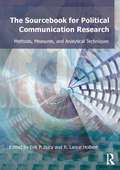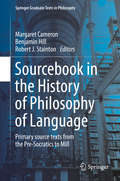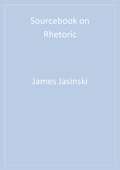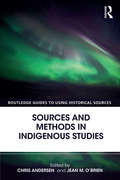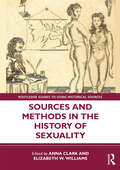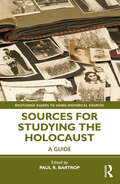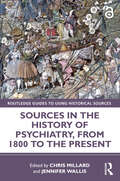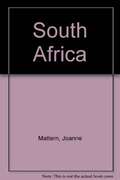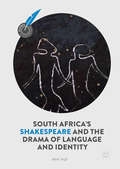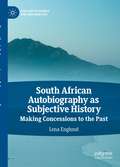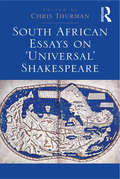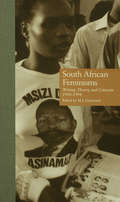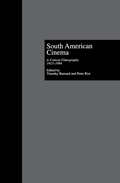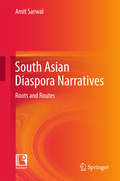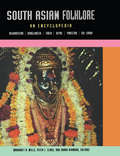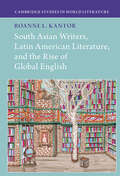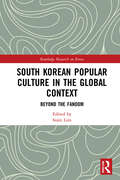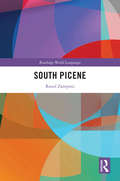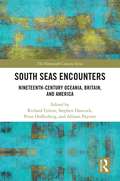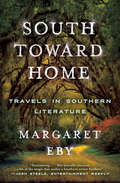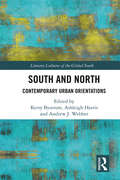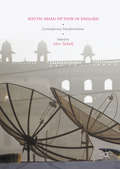- Table View
- List View
Sourcebook for Political Communication Research: Methods, Measures, and Analytical Techniques (Routledge Communication Series)
by R. Lance Holbert Erik P. BucyThe Sourcebook for Political Communication Research will offer scholars, students, researchers, and other interested readers a comprehensive source for state-of-the-art/field research methods, measures, and analytical techniques in the field of political communication. The need for this Sourcebook stems from recent innovations in political communication involving the use of advanced statistical techniques, innovative conceptual frameworks, the rise of digital media as both a means by which to disseminate and study political communication, and methods recently adapted from other disciplines, particularly psychology, sociology, and neuroscience. Chapters will have a social-scientific orientation and will explain new methodologies and measures applicable to questions regarding media, politics, and civic life. The Sourcebook covers the major analytical techniques used in political communication research, including surveys (both original data collections and secondary analyses), experiments, content analysis, discourse analysis (focus groups and textual analysis), network and deliberation analysis, comparative study designs, statistical analysis, and measurement issues.
Sourcebook in the History of Philosophy of Language
by Robert J. Stainton Benjamin Hill Margaret CameronFor the first time in English, this anthology offers a comprehensive selection of primary sources in the history of philosophy of language. Beginning with a detailed introduction contextualizing the subject, the editors draw out recurring themes, including the origin of language, the role of nature and convention in fixing form and meaning, language acquisition, ideal languages, varieties of meanings, language as a tool, and the nexus of language and thought, linking them to representative texts. The handbook moves on to offer seminal contributions from philosophers ranging from the pre-Socratics up to John Stuart Mill, preceding each major historical section with its own introductory assessment. With all of the most relevant primary texts on the philosophy of language included, covering well over two millennia, this judicious, and generous, selection of source material will be an indispensable research tool for historians of philosophy, as well as for philosophers of language, in the twenty-first century. A vital tool for researchers and contemporary philosophers, it will be a touchstone for much further research, with coverage of a long and varied tradition that will benefit today's scholars and enhance their awareness of earlier contributions to the field.
Sourcebook on Rhetoric
by Dr James L. JasinskiThis book is designed to introduce readers to the language of contemporary rhetorical studies. The book format is an alphabetized glossary (with appropriate cross listings) of key terms and concepts in contemporary rhetorical studies. An introductory chapter outlines the definitional ambiguities of the central concept of rhetoric itself. The primary emphasis is on the contemporary tradition of rhetorical studies as it has emerged in the discipline of speech communication. Each entry in the glossary ranges in length from a few paragraphs to a short essay of a few pages. Where appropriate, examples are provided to further illustrate the term or concept. Each entry will be accompanied by a list of references and additional readings to direct the reader to other materials of possible interest.
Sources and Methods in Indigenous Studies (Routledge Guides to Using Historical Sources)
by RoutledgeSources and Methods in Indigenous Studies is a synthesis of changes and innovations in methodologies in Indigenous Studies, focusing on sources over a broad chronological and geographical range. Written by a group of highly respected Indigenous Studies scholars from across an array of disciplines, this collection offers insight into the methodological approaches contributors take to research, and how these methods have developed in recent years. The book has a two-part structure that looks, firstly, at the theoretical and disciplinary movement of Indigenous Studies within history, literature, anthropology, and the social sciences. Chapters in this section reveal that, while engaging with other disciplines, Indigenous Studies has forged its own intellectual path by borrowing and innovating from other fields. In part two, the book examines the many different areas with which sources for indigenous history have been engaged, including the importance of family, gender, feminism, and sexuality, as well as various elements of expressive culture such as material culture, literature, and museums. Together, the chapters offer readers an overview of the dynamic state of the field in Indigenous Studies. This book shines a spotlight on the ways in which scholarship is transforming Indigenous Studies in methodologically innovative and exciting ways, and will be essential reading for students and scholars in the field.
Sources and Methods in the History of Sexuality (Routledge Guides to Using Historical Sources)
by Anna Clark Elizabeth W. WilliamsSources and Methods in the History of Sexuality outlines some of the challenges of retracing sexual acts, identities, and desires in the past, and shows how historians have responded to these methodological challenges with ingenuity and creativity.The volume acknowledges that the history of sexuality poses particularly interesting challenges in relation to sources due the peculiar nature of sexuality. On one hand, sexuality is frequently hidden and private, its practices often unknown, denied, and evaded, its desires fleeting or obsessive, its reality confused or illuminated by fantasy; yet on the other, sexuality consistently breaks into the public sphere through moral panics, waves of persecution, taxonomizing projects, and medical/juridical interventions. With vivid case studies from renowned contributors, the chapters provide different theoretical approaches along with more practical examples of how to study the history of sexuality. The volume has a broad chronology from the ancient world to the present, an extensive geography covering not only Europe and the Americas but also Latin America and Africa, and also includes a variety of gender and sexual expressions. The book also privileges texts that offer an intersectional approach, asking how sex and sexualities were constructed alongside/against other categories of difference.With accessible writing, this volume encourages the reader to think creatively about how to find evidence of sex/sexuality in the past and will be of value to students as well as scholars interested in the history of sexuality.
Sources for Studying the Holocaust: A Guide (Routledge Guides to Using Historical Sources)
by Paul R. BartropSources for Studying the Holocaust provides a pathway for readers to engage with questions about what sources can be used to study the Holocaust. For many historians, the challenge has been how to rescue the story from oblivion when oft-used sources for other periods of history introduce even more issues around authenticity and reliability. What can be learned of what transpired in villages and towns numbering several thousand people, when all its Jewish inhabitants were totally obliterated through Nazi action? Who can furnish eyewitness testimony, if all the eyewitnesses were killed? How does one examine written records preserving knowledge of facts or events, where none were kept or survived the onslaught? And what weight do we put upon such resources which did manage to endure the destruction wrought by the Holocaust? Each chapter looks at one of a diverse range of source materials from which scholars have rescued the history, including survivor testimony, diaries, letters, newspaper accounts, photographs, trial documents, artefacts, digital resources, memorials, films, literature, and art. Each chapter shows how different types of records can be utilised as accurate sources for the writing of Holocaust history. Collectively, they highlight the ways in which all material, even the most fragmentary, can be employed to recreate a reliable record of what happened during the Holocaust and show how all sources considered can be employed to find meaning and understanding by exploring a range of sources deeply. This book is a unique analysis of the types of sources that can be used to access the history of Holocaust. It will be of invaluable interest to readers, students, and researchers of the Holocaust.
Sources in the History of Psychiatry, from 1800 to the Present (Routledge Guides to Using Historical Sources)
by Chris MillardThis book offers a general introduction to historical sources in the history of psychiatry, delving into the range of sources that can be used to investigate this dynamic and exciting field. The chapters in this volume deal with physical sources that might be encountered in the archive, such as asylum casebooks, artwork, material artefacts, post-mortem records, more general types of source including medical journals, literature, public enquiries, and key themes within the field such as feminist sources, activist and survivor sources. Offering practical advice and examples for the novice, as well as insightful suggestions for the experienced scholar, the authors provide worked-through examples of how various source types can be used and exploited and reflect productively on the limits and constraints of different kinds of source material. In so doing it presents readers with a comprehensive guide on how to ‘read’ such sources to research and write the history of psychiatry. Methodically rigorous, clear and accessible, this is a vital reference for students just starting out within the field through to more experienced scholars experimenting with new and unfamiliar sources in the history of medicine and history of psychiatry more specifically.
South Africa (Reading Essentials in Social Studies: Country Connections)
by Joanne MatternDiscover South Africa, a country with four distinct ethnic groups that are finally coming together after years of segregation.
South Africa's Shakespeare and the Drama of Language and Identity (Global Shakespeares)
by Adele SeeffThis volume considers the linguistic complexities associated with Shakespeare’s presence in South Africa from 1801 to early twentieth-first century televisual updatings of the texts as a means of exploring individual and collective forms of identity. A case study approach demonstrates how Shakespeare’s texts are available for ideologically driven linguistic programs. Seeff introduces the African Theatre, Cape Town, in 1801, multilingual site of the first recorded performance of a Shakespeare play in Southern Africa where rival, amateur theatrical groups performed in turn, in English, Dutch, German, and French. Chapter 3 offers three vectors of a broadening Shakespeare diaspora in English, Afrikaans, and Setswana in the second half of the nineteenth century. Chapter 4 analyses André Brink’s Kinkels innie Kabel, a transposition of Shakespeare’s The Comedy of Errors into Kaaps, as a radical critique of apartheid’s obsession with linguistic and ethnic purity. Chapter 5 investigates John Kani’s performance of Othello as a Xhosa warrior chief with access to the ancient tradition of Xhosa storytellers. Shakespeare in Mzansi, a televisual miniseries uses black actors, vernacular languages, and local settings to Africanize Macbeth and reclaim a cross-cultural, multilingualism. An Afterword assesses the future of Shakespeare in a post-rainbow, decolonizing South Africa. Global Sha Any reader interested in Shakespeare Studies, global Shakespeare, Shakespeare in performance, Shakespeare and appropriation, Shakespeare and language, Literacy Studies, race, and South African cultural history will be drawn to this book.
South African Autobiography as Subjective History: Making Concessions to the Past (African Histories and Modernities)
by Lena EnglundThis book examines 21st-century South African autobiographical writing that addresses the nation’s socio-political realities, both past and present. The texts in focus represent and depict a South Africa caught in the midst of contradictory and competing images of the ‘Rainbow Nation’. Arguing that recent memoirs question and criticize the illusion of a united nation, the study shows how these texts reveal the flaws and shortcomings not only of the apartheid past but of contemporary South Africa. It encompasses a broad range of autobiographical works, largely published since 2009, that engage with South Africa’s past, present and future. At its centre is the quest for space and belonging, and this book investigates who can comfortably ‘belong’ in South Africa in its post-apartheid, post-Truth and Reconciliation, post-Mbkei and post-Zuma state.
South African Essays on 'Universal' Shakespeare
by Chris ThurmanSouth African Essays on ’Universal’ Shakespeare collects new scholarship and extant (but previously unpublished) material, reflecting the changing nature of Shakespeare studies across various ’generation gaps’. Each essay, in exploring the nuances of Shakespearean production and reception across time and space, is inflected by a South African connection. In some cases, this is simply because of the author’s nationality or institutional affiliation; in others, there is a direct engagement with what Shakespeare means, or has meant, in South Africa. By investigating the universality of Shakespeare from both implicitly and explicitly ’southern’ perspectives, the book presents new possibilities for considering (and reassessing) shifting manifestations of Shakespeare’s work in major Shakespearean ’centres’ such as Britain and the United States, as well as across the global North and South.
South African Feminisms: Writing, Theory, and Criticism,l990-l994 (Gender and Genre in Literature #Vol. 5)
by M. J. DaymondThis is the first collection of feminist critical essays by and about women in South Africa to appear outside of that country. Many of the pieces were written after February 1990, when President de Klerk lifted the ban on black political organizations. The recognition that a just society cannot be achieved without freedom from gender oppression as well as racial oppression informs these essays and has a direct bearing on the creation of a new society in South Africa.
South American Cinema: A Critical Filmography, l915-l994 (Historical Dictionaries Of Literature And The Arts Ser.)
by Timothy Barnard Peter RistFirst Published in 1996. This text looks at the cinema from the countries of Argentina, Brazil, Canada, Chile, Colombia, Cuba, United States, Uruguay and Venezuela. Presented by country and date order it includes the silent black and white Gaucho films of 1915 to the colour films coming out of Venezuela in 1991. Each entry provides a summary of the film content, its context, production and significance in the genre. It includes an index and glossary of Brazilian (Portuguese or African) Terms and film terms.
South Asian Diaspora Narratives
by Amit SarwalSome happy occasions, like the 1995 Commonwealth Writers' Prize for Best Book to Bangladeshi-Australian author Adib Khan, the 2008 Man Booker Prize to Indian born Australian writer Arvinda Adiga, and the 2013 Australian Prime Minister's Literary Award for Fiction to Sri Lankan-Australian author Michele de Krester, have boosted the self-confidence of South Asian-Australian writers in Australia. South Asian diasporic communities have also been the focus for relatively small, but constantly growing, studies by anthropologists and sociologists on the interrelation of gender, race, ethnicity and migration in Australia. The terms "Labels" and "Locations" capture numerous aspects that contribute in the making of a diasporic consciousness. This book critically examines the issues of identity, gender, family, class and caste, expressed in the short narratives of South Asian diaspora writers based in Australia. Taking an interdisciplinary approach--from literary, cultural, historical, anthropological, and sociological studies--this book engages chiefly with the oeuvre of postcolonial writers and academics, namely: Mena Abdullah, Adib Khan, Yasmine Gooneratne, Michelle De Kretser, Chandani Lokuge, Chitra Fernando, Satendra Nandan, Suneeta Peres da Costa, Hanifa Deen, Christopher Cyrill, Suvendrini Perera, Sunil Govinnage, Brij V. Lal, Sunil Badami, Glenn D'Cruz, Chris Raja, Manik Datar, David De Vos, Rashmere Bhatti, Kirpal Singh Chauli, Sujhatha Fernandes, Neelam Maharaj, Sushie Narayan, Madu Pasipanodya, Shrishti Sharma, Beryl T. Mitchell, and Sunitha. This book will, by calling upon the works of this much-neglected South Asian diaspora group, fill a lacuna in the broader critical rubric of diaspora studies.
South Asian Folklore: An Encyclopedia
by Margaret A. MillsWith 600 signed, alphabetically organized articles covering the entirety of folklore in South Asia, this new resource includes countries and regions, ethnic groups, religious concepts and practices, artistic genres, holidays and traditions, and many other concepts. A preface introduces the material, while a comprehensive index, cross-references, and black and white illustrations round out the work. The focus on south Asia includes Afghanistan, Bangladesh, India, Pakistan, and Sri Lanka, with short survey articles on Tibet, Bhutan, Sikkim, and various diaspora communities. This unique reference will be invaluable for collections serving students, scholars, and the general public.
South Asian Writers, Latin American Literature, and the Rise of Global English (Cambridge Studies in World Literature)
by Roanne KantorEver since T.B. Macaulay leveled the accusation in 1835 that 'a single shelf of a good European library was worth the whole native literature of India,' South Asian literature has served as the imagined battleground between local linguistic multiplicity and a rapidly globalizing English. In response to this endless polemic, Indian and Pakistani writers set out in another direction altogether. They made an unexpected journey to Latin America. The cohort of authors that moved between these regions include Latin-American Nobel laureates Pablo Neruda and Octavio Paz; Booker Prize notables Salman Rushdie, Anita Desai, Mohammed Hanif, and Mohsin Hamid. In their explorations of this new geographic connection, Roanne Kantor claims that they formed the vanguard of a new, multilingual world literary order. Their encounters with Latin America fundamentally shaped the way in which literature written in English from South Asia exploded into popularity from the 1980s until the mid-2000s, enabling its global visibility.
South Carolina PASS Coach, Social Studies (Grade #5)
by CoachThis book provides instruction and practice with all the important skills you need to know, and gives you practice answering the kinds of questions you will see on your state's test. The Coach book is organized into chapters and lessons, and includes a Pretest and Posttest. Before you begin the first chapter, your teacher may want you to take the Pretest, which will help you identify skill areas that need improvement. Once you and your teacher have identified those skills, you can select the corresponding skills lessons and start with those. Or, you can begin with the first chapter of the book and work through to the end. After you have finished all the lessons in the book, you can take the Posttest to see how much you've improved. And even if you did well on the Pretest, you'll probably do better on the Posttest because practice makes perfect!
South Korean Popular Culture in the Global Context: Beyond the Fandom (Routledge Research on Korea)
by Sojin LimThis book explores the recent landscape of Korean popular culture, including celebrity diplomacy, political activism, and inter-Korean relations in the era of ‘ontact’, with a special focus on K-pop and K-drama. Utilising the interdisciplinary approach, along with theoretical accounts, it redefines popular culture and its true power – beyond soft power – including discussions of how the pandemic and the use of online platforms have coincidently or effectively influenced recent phenomena surrounding Korean popular culture. It reveals both the possibilities and pitfalls of Hallyu diplomacy and the UN’s celebrity diplomacy more broadly, and highlights how, through the mobilisation of a large internet fanbase, the modern K-pop ‘standom’ can influence political discourse. The book also features an examination of the political significance of the K-drama through which it highlights the potential of popular media to impact inter-Korean relations and inform current international understanding and perception of the Korean conflict. Dealing with the wider scope of Korean popular culture this book will be a valuable resource to students and scholars of South Korea, international relations, public diplomacy, political activism, and cultural and media studies.
South Picene (Routledge World Languages)
by Raoul ZamponiSouth Picene is the pre-Roman language spoken in the Adriatic sector of central Italy. This book presents a description of what we know about the structure of this language. South Picene is (together with Umbrian, Oscan, Latin, and Faliscan) one of the few members of the Italic branch of the Indo-European family and is also one of the European languages with the oldest existing texts (550 BCE). Besides a grammatical outline of the language, the book contains the linguistic (and often stylistic) analysis of all the 21 inscriptions that compose the South Picene epigraphic corpus and a word list. South Picene will be of interest to students and scholars of Indo-European languages, Italic languages, and in general, ancient languages of the Italian peninsula.
South Seas Encounters: Nineteenth-Century Oceania, Britain, and America (The Nineteenth Century Series)
by Richard Fulton Peter Hoffenberg Stephen Hancock Allison PaynterSouth Seas Encounters examines several key types of encounters between the many-faceted worlds of Oceania, Britain and the United States in the formative nineteenth century. The eleven essays collected in this volume focus not only on the effect of the two powerful, industrialized colonial powers on the cultures of the Pacific, but the effect of those cultures on the Western cultural perceptions of themselves and the wider world, including understanding encounters and exchanges in ways which do not underemphasize the agency and consequences for all participating parties. The essays also provide insights into the causes, unfolding, and consequences for both sides of a series of significant ethnographic, political, cultural, scientific, educational, and social encounters. This volume makes a significant contribution to increasing scholarly interest in Oceania’s place in British and American nineteenth-century cultural experiences. South Seas Encounters investigates these significant interactions and how they changed the ways that Oceanic, British, and American cultures reflected on themselves and their place in the wider world.
South Toward Home: Travels in Southern Literature
by Margaret EbyA literary travelogue into the heart of classic Southern literature. What is it about the South that has inspired so much of America's greatest literature? And why, when we think of Flannery O'Connor or William Faulkner or Harper Lee, do we think of them not just as writers, but as Southern writers? In South Toward Home, Margaret Eby--herself a Southerner--travels through the South in search of answers to these questions, visiting the hometowns and stomping grounds of some of our most beloved authors. From Mississippi (William Faulkner, Eudora Welty, Richard Wright) to Alabama (Harper Lee, Truman Capote) to Georgia (Flannery O'Connor, Harry Crews) and beyond, Eby looks deeply at the places that these authors lived in and wrote about. South Toward Home reveals how these authors took the people and places they knew best and transmuted them into lasting literature. Side by side with Eby, we meet the man who feeds the peacocks at Andalusia, the Georgia farm where Flannery O'Connor wrote her most powerful stories; we peek into William Faulkner's liquor cabinet to better understand the man who claimed civilization began with distillation and the "postage stamp of native soil" that inspired him; and we go in search of one of New Orleans's iconic hot dog vendors, a job held by Ignatius J. Reilly in John Kennedy Toole's A Confederacy of Dunces. From the library that showed Richard Wright that there was a way out to the courtroom at the heart of To Kill a Mockingbird, Eby grapples with a land fraught with history and mythology, for, as Eudora Welty wrote, "One place understood helps us understand all places better." Combining biographical detail with expert criticism, Eby delivers a rich and evocative tribute to the literary South.
South and North: Contemporary Urban Orientations
by Kerry Bystrom Ashleigh Harris Andrew J. WebberThis book explores urban life and realities in the cities of the Global South and North. Through literature, film and other forms of media that constitute shared social imaginaries, the essays in the volume interrogate the modes of production that make up the fabric of urban spaces and the lives of their inhabitants. They also rethink practices that engender ‘cityness’ in diverse but increasingly interlinked conglomerations. Probing ‘orientations’ of and within major urban spaces of the South –Jakarta, Rio de Janeiro, Tijuana, Delhi, Kolkata, Luanda and Johannesburg –the book reveals the shared dynamics of urbanity built on and through the ruins of imperialism, Cold War geopolitics, global neoliberalism and the recent resurgence of nationalism. Completing a kind of arc, the volume then turns to cities located in the North such as Paris, Munich, Dresden, London and New York to map their coordinates in relation to the South. The volume will be of great interest to scholars and researchers of media and culture studies, city studies, development studies, Global South studies, urban geography, built environment and literature.
South and Southeast Asian Psycholinguistics
by Heather Winskel Prakash PadakannayaA large body of knowledge has accumulated in recent years on the cognitive processes underlying language, much of which comes from studies of Indo-European languages, in particular English. This groundbreaking volume explores the languages of South and Southeast Asia, which differ significantly from Indo-European languages in their grammar, lexicon and spoken forms. This book raises new questions in psycholinguistics and enables readers to re-evaluate previous models in light of new research. With thirty-six chapters divided into three parts - Language Acquisition, Language Processing and Language and Brain - it examines contemporary topics alongside new findings in areas such as first and second language acquisition, the development of literacy, the diagnosis of language and reading disorders, and the relationship between language, brain, culture and cognition. It will be invaluable to all those interested in the languages of South and Southeast Asia, as well as psychologists, linguists, educationalists, speech therapists and neuroscientists.
South-Asian Fiction in English
by Alex TickellThis collection offers an essential, structured survey of contemporary fictions of South Asia in English, and includes specially commissioned chapters on each of the national traditions of the region. It covers less well known writings from Pakistan, Sri Lanka and Bangladesh as well as the more firmly established canon of contemporary Indian literature, and features chapters on important new and emergent forms such as the graphic novel, genre fiction and the short story. It also contextualizes some key 'transformative' aspects of recent fiction such as border and diaspora identities; new middle-class narratives and popular genres; and literary response to terror and conflict. Edited and designed with researchers and students in mind, the book updates existing criticism and represents a readable guide to a dynamic, rapidly changing area of global literature.
